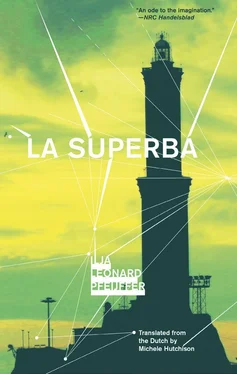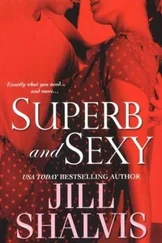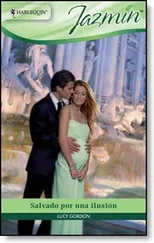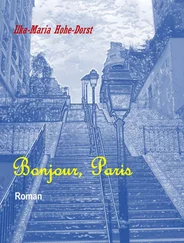“How’s business?”
He responded with a helpless smile. I invited him to join me, and ordered a small beer for him. He put his bucket of roses down on the ground. He sighed.
“Why did you come here, Ilja?”
I took a sip of my Negroni and pondered the question.
“You come from the north, Ilja. There’s so much rain there the fields are green and the roses flower on their bushes for free. There’s free money for everyone who goes to the counter. You’re given a clean house in a safe neighborhood bordered by grassy pastures and there are windmills, cheese farms, and pancake restaurants, and after a while you can pick up your Mercedes from Social Services. Am I right or am I right?”
I smiled.
“Well?”
I ordered another Negroni for myself and a small beer for him.
“You’re an intelligent man, Rashid, you know you’re talking bullshit.”
“That’s not what they think in Africa.”
A beggar came to ask for money. I automatically waved him off. Rashid spat in his face.
“Well?”
“Well what?”
“Why did you come here, Ilja?”
“And you?”
“I asked you first.”
“I came here to write a book.”
“That’s not an answer.”
“Why shouldn’t that be an answer?”
“Because you don’t listen to a woman until you’ve looked her in the eye.”
“Is that a well-known Arabic saying then?”
“No, I made it up myself.”
“And what do you mean by it?”
“That you don’t start writing about something until you’re already fascinated by it, which implies that you already know it, and so you came here for other reasons at the start, and after that you decided to write a book about the city to give yourself an alibi.”
“Do you really think that, Rashid?”
“Yes, I really do.”
“You’re too intelligent to be selling roses.”
“I know that.”
15.
“I’ll tell you the truth, Rashid. That northern paradise of yours, where the grass is always green because it’s always raining, that’s where I was born and where I spent my whole life. In a way, it really is a paradise. It’s a peaceful, multicolored country. The trains are blue and yellow and run on time through the tulip fields. The tax forms are blue or pink and easy to fill in. If you have to pay something, you don’t have to try to be clever or come up with a plan because you won’t get out of paying it, and when you get a rebate, you get it back that very same month. Blonde girls spray their stolen bikes pink. Policemen smile. They tell you to clip on a red backlight next time and hand out stickers against racism. The waste is separated and goes in containers of various bright colors. There are special offers at the supermarket that everyone can take advantage of and if you take advantage enough, they give you free little multicolored fluffy creatures that you can stick to your dashboard with their sticky feet, or to your windowsill, or wherever you want. But you know what the thing is, Rashid?”
“What?”
“Exactly that.”
I ordered myself another Negroni and a small beer for him. We clinked glasses. “To looking women in the eye, then.”
“But what exactly?”
“What do you mean?”
“You didn’t finish your story.”
“In a way, I did. In a way, I’ve said everything, Rashid. In my homeland, I had it easy all my life and lived well. But it was too easy and too good. I knew the way from my house to the station like the back of my hand, from the supermarket to my house and from one bar to the other. Do you have that expression in Arabic too? Like the back of your hand? I fell asleep even before I went to bed, in a manner of speaking, and didn’t even wake up in the meantime. I knew everything already. I knew the story already. And at the end of the day, I’m an artist. I need input. Inspiration is what they call it, but I hate that word. The challenge to wake up in a new city where nothing is obvious and where I have the freedom to reinvent myself anew. The challenge of waking up. Got that?
“Maybe I should apologize for my choice of words. I wouldn’t ever put words like ‘input’ and ‘challenge’ in my writing. I just wanted to say that a comfortable life also has its disadvantages. Comfort is like a lullaby, a drug, an antidepressant that numbs the emotions. You can see it on the faces of the people in my homeland. They have the limp expressionlessness of people who no longer have to fight for anything and aren’t particularly pleased about it because it’s become normal for everything to function perfectly. Or sometimes the sensation takes the form of a kind of unspoken complacency that looks down on the world pityingly from the top of a tall, gangly body with the expression of someone who doesn’t have to have seen everything to fully grasp everything that’s different and automatically consider it inferior. Although there are more poets than tax inspectors, my homeland isn’t a very poetic country.
“Here in Italy nothing goes without saying and everything has to be continually re-fought. Because the system doesn’t work. Because there is no system. And if there were one, nobody would believe in it. Or circumnavigate it for a joke. Out of habit. Or to gain some minute advantage. Or not even. In the perpetual opera buffa of daily life, the simplest of actions, like buying bread at the bakery, or picking up a parcel from the post office, can come complete with the most unexpected complications. This entire country called Italy depends on improvisation. That’s why Italians are the most resourceful, resilient, and creative people I know. I enjoy that. It awakened me. That’s why I’m here. Is that an answer, Rashid?”
He didn’t say anything, but finished his beer and stood up. Salvatore walked past with his bad leg but ignored us.
“What is it, Rashid? Have I said something wrong?”
“Is there poverty in your country? Have you ever gone hungry there? Is there a fucking civil war? Are you being politically persecuted? And how did you get here — in an unreliable inflatable dinghy without any gas, or by EasyJet?”
“Sit down, Rashid, please. I only told you my story because you asked for it. Let’s talk about your story now.”
He went to the toilet, came back, picked up his bucket of roses and walked off without saying anything. Without even thanking me for the beers. But that was fine, I understood. Maybe he had just enough time to walk all the way to Nervi and sell part of the contents of his bucket. When I finished my Negroni and went inside to pay, it turned out he’d already paid the entire bill.
16.
Before disembarrassing myself of her for the second and final time, I wanted to see her again. I got the plastic bag out of the wardrobe and began to open it. It was difficult. I’d knotted it really well. And that turned out to be no bad thing because when I finally managed to open the bag such a foul smell wafted out I almost vomited. Holding my breath, I quickly re-knotted the bag even more tightly than before. And when I remembered that I’d stroked and caressed that dead, rotting piece of human offal, I really did throw up.
If I ever reworked these notes I’m sending to you regularly, of course I’ll take out that shameful fumbling with the leg. That stays between us, my good friend, you’ll understand that. But that would be a bit of a shame because I’d be leaving out an opportunity to exploit the affair as a striking metaphor for that misunderstanding we call love. You love a woman with the passion of a man who, against his better judgment, decides to believe in a forever — which, once you’ve realized that she only exists in your fantasies, is yet again surprisingly brief — upon which you dump her; and when you think back later to that umpteenth best time of your life and re-read the diary in which your sensitive caresses reverberate in the blistering blindness of your delusions, a smell of decay rises up that almost or actually does make you throw up at your own naive romanticism. Something like that. I’d put it less crudely so as not to scare off too many readers. And I’d invent an affair to breathe life into the metaphor. For example, I’d take a character like myself, too often disappointed and, more often than that, too disappointing in love to still believe in fairy tales, a cynic and an avowed bachelor who only ever has meaningless one-night stands these days, and not even that often, and put him in a position like mine: an immigrant in a new, sunny country; and against his wishes and against his better judgment, I’d let him fall completely, utterly, hopelessly in love again with a sizzling southern woman, the most beautiful girl in the city. And then of course I’d have it all go wrong. Something to do with cultural differences. Something about a fundamental lack of understanding. Something about his fantasies being quite different from hers. So that his deeply engrained cynicism is once again painfully justified, and when he looks in the mirror after that he feels sick. And then the metaphor of the leg. That might work, don’t you think?
Читать дальше












